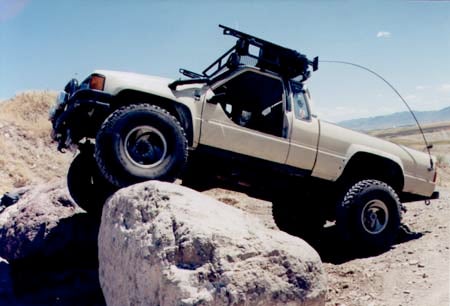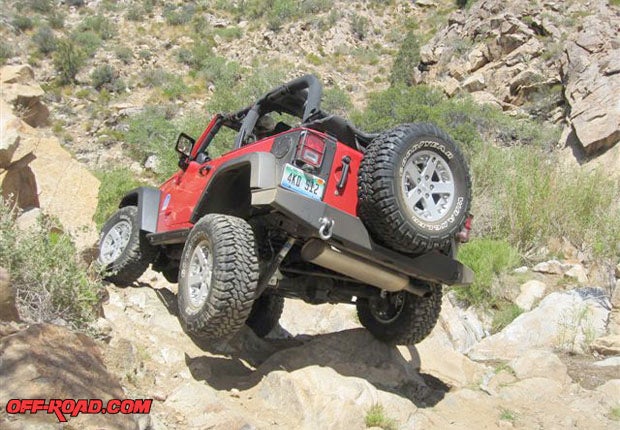
We four-wheelers are naturally conscientious folks, and are always concerned about our impact on the environment. Unfortunately, we sometimes are faced with leaks and spills from our vehicles.
Engine oil, transmission oil, gear oil, brake fluid and radiator fluid can have a devastating effect on the environment and wildlife. Radiator fluid is particularly hazardous, as its sweet taste makes it attractive to mammals. Worse, it doesn't take much to kill. One teaspoon of ethanol glycol will kill a cat; three tablespoons will put down a dog. I highly recommend you switch to a propylene-based radiator fluid like Sierra brand. If by chance you spill some and don't get it cleaned up thoroughly, there's less of a risk to native animals.
As with any exercise, planning and preparation are key. Essential clean-up items include a plastic container with a tight lid (Tupperware products work nicely), kitty litter, paper towels or rags, and a shovel. You probably already have paper or plastic cups in your vehicle. If not, grab some. High-tech absorbents and wipes are available for large oil spill situations and to wipe down rocks surfaces. You may want to pick up some to help with those problems.
If you choose to build a spill kit, I highly recommend you include kitty litter. It is one of the most absorbent materials around. NewPig (http://www.newpig.com/) offers a variety of useful materials as well as complete spill kits.
Before dealing with any spill or leak, make sure that the vehicle is secure and that all passengers are safe.
First, catch any dripping liquid in a plastic container. Use a cup to scoop up pools of liquid. If need be, dam up the area to keep the spill from spreading. Use special absorbent rolls like the Pig Blue Socks, or build a mini earthen dike around the spill.
Next, spread kitty litter or other absorbent material to soak up the spill. Paper towels, rags, diapers, even a t-shirt or sweat shirt will do in an emergency.

You should also pack absorbents and wipes designed for oil spills. Two others that are particularly effective are PeatSorb (http://www.peatsorb.com/ ) and Oil-Dri (http://ww.oildri.com/indusauto/index.html). You may find these products locally, but look for a retailer who breaks down the bulk quantities and offers these materials in smaller units. You'll save money by buying larger quantities and breaking them down for yourself and friends into individual spill kits. (I can add other vendors to this list on my Web site. Send me the details about companies you are familiar with or discover locally who provide spill kits.)
PeatSorb is ideal because it is very effective on grease and oil spots (even on rock), and it is naturally decomposing.
Everything is hauled out. Proper clean up means that the spilled liquid and contaminated soils are removed for proper disposal. All material and soil should be collected in plastic bags; double-bag, if possible. Place the bags on the rubber floor mats in case there's a leak. Gear oil, in particular, leaves a nasty smell in your carpet that is very difficult to remove. Remember to wipe down rocks with the proper absorbent pads available from PeatSorb and Oil-Dri.
Make sure the lid is secure on your container(s). You don't want the fluids and kitty litter spilling all over the inside of your vehicle.
When you get home, dispose of the mess in the proper manner. Call your local authorities if you have any questions about how to handle this material. You may be able to use PeatSorb-treated soil. The manufacturer claims that the soil is safe to use for planting in three weeks.
Toxic spills are a potential with off-road driving. Quick action on your part, using ordinary household products, will ensure you leave the area as you found it.
MORE TRAIL TIPS STORIES
Trail Tips: A Fire Extinguisher is Crucial Off-Road Gear
Trail Tips: Clean Up, Clear Out For The New Year
Trail Tips: Proper Storage Maximizes Space, Minimizes Down Time
Badlands Off-Road Adventure
Off-road trainer Tom Severin shares insight and tips on a variety of topics related to preparing you for that next off-road adventure. With over 40 years of off-road experience, Severin operates under his business Badlands Off-Road Adventures. He is a certified professional 4WD Trainer by the International 4-Wheel Drive Trainers Association and a Wilderness First Responder (WFR). He is a member of the California Association of Four Wheel Drive Clubs (CA4WDC), United Four Wheel Drive Associations and the BlueRibbon Coalition. He also is a certified UFWDA and a CA4WDC 4WD instructor.
For more information about Badlands Off-Road Adventures, 4x4training.com.


 Your Privacy Choices
Your Privacy Choices